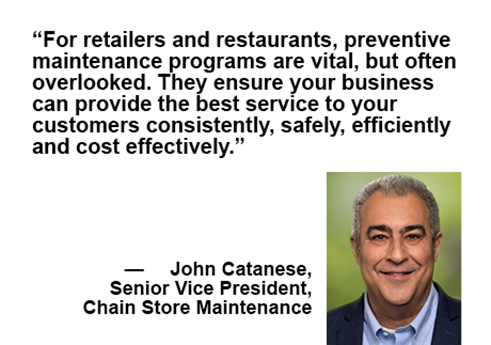Restaurants and retailers move fast. There’s no time for unexpected maintenance issues to slow you down. Preventive maintenance (PM) programs can help you avoid disruptions.
“For retailers and restaurants, preventive maintenance programs are vital, but often overlooked,” says John Catanese, senior vice president at Chain Store Maintenance, an MCS Company. “They ensure your business can provide the best service to your customers consistently, safely, efficiently and cost effectively.”
Why PM Matters
Preventive maintenance delivers several key advantages:
Enhanced reliability. By addressing minor issues before they escalate, you can prevent unexpected breakdowns at the worst possible time.
Cost savings. Regular maintenance helps avoid costly emergency repairs and extends the lifespan of your equipment, saving money now and in the long run.
Greater control. Monitoring your equipment’s condition, repair history and age allows you to plan replacements strategically, minimizing disruptions and scheduling updates when it’s convenient.
Improved safety. Keeping systems in top condition ensures they meet health and safety codes while reducing the risk of hazardous equipment failures.
Essential PM Programs for Restaurants and Retailers
“Every business has different preventive maintenance needs,” Catanese says. Here are 11 essential PM programs that retailers and restaurants should consider as part of their multi-site facilities maintenance programs.
1. Grease Trap
Emptying grease traps prevents sludge from reentering the water supply and keeps you in compliance with municipal codes. Implementing a PM program for your grease traps empowers your services partner to take over maintenance, as well as ensures compliance with fats, oils and grease (FOG) inspections and reports.
2. Backflow
Backflow testing and maintenance services are essential for preventing untreated or contaminated water from flowing back into the clean water supply, a requirement enforced by municipalities. By setting up a regular backflow testing schedule with your services partner, you can track data, identify locations due for service and reduce the risk of shutdowns.
3. Tankless Water Heater
Tankless water heaters provide hot water instantly, without the storage tank conventional water heaters require. They need to be flushed at least annually (and more frequently if you have hard water) to prevent and remove sediment buildup that can cause problems and shorten their life.
4. Jetting
Jetting employs high-pressure water nozzles to quickly and efficiently clear debris and buildup in pipes. For high-traffic properties, preventive jetting services to flush out your plumbing lines are crucial for avoiding backups and emergency calls. Your partner should conduct this service at least quarterly.
5. Locks
From security breaches and accessibility issues to employee turnover and aging locks, a PM program ensures timely maintenance and replacement of your locks as needed to safeguard your business. Consider a direct-buy option through your service partner to streamline this process, limiting costs, establishing hardware consistency and saving time — especially if you need to change locks frequently.
6. Pest Control
Your services partner should visit at least monthly, noting any needed pest-proofing work. If any issues are discovered, they’ll likely recommend additional traps, treatments or exclusionary solutions, as well as cleaning to resolve issues (particularly food-related ones).
7. Parking Lots
PM for parking lots ensures your lots remain in top condition and your employees and customers stay safe. It should include services like regular sweeping and addressing low spots or areas of standing water, as well as repainting lines, sealing cracks before they can become hazards, maintaining lighting and signage, and repaving as needed.
8. Lift Station
As part of your lift station PM plan, at least twice per year your services partner should perform a check of the station, including floats and grinder pumps, to ensure they’re functioning properly. The station should be drained and cleaned by pressure-washing the tank at least annually.
9. Fire Extinguisher
As part of a PM program, your services provider should evaluate your property and fire extinguisher needs, inspect the manual components of your extinguishers and refill or recharge them annually to ensure you are up to code for your area.
10. Hood Cleaning
Grease buildup can be a major fire hazard for restaurants. As part of an effective hood cleaning program, your services provider will conduct comprehensive vent hood cleaning, from stovetop to rooftop, to meet NFPA 96 standards. Hoods should be inspected, cleaned and polished at least twice per year, with the date recorded.
11. Commercial Refrigerators and Ice Machines
Preventive maintenance should be performed on refrigeration units quarterly (or at least semiannually) following ASHRAE standards for refrigeration. Because ice machines require constant maintenance, your services partner must ensure they stay clean and in working order.
Safeguarding your establishment and staying up to code is a critical part of restaurant and retail facilities management.
“When you have a trusted service partner, you can stay on top of your preventive maintenance and keep solid records of the work,” Catanese says. “We’ve seen it time and time again: Preventive maintenance isn’t just another expense; it’s an investment that pays off.”
— Chain Store Maintenance, an MCS Company, is a content partner of Retail & Restaurant Facility Business. For more content partner articles, click here.
